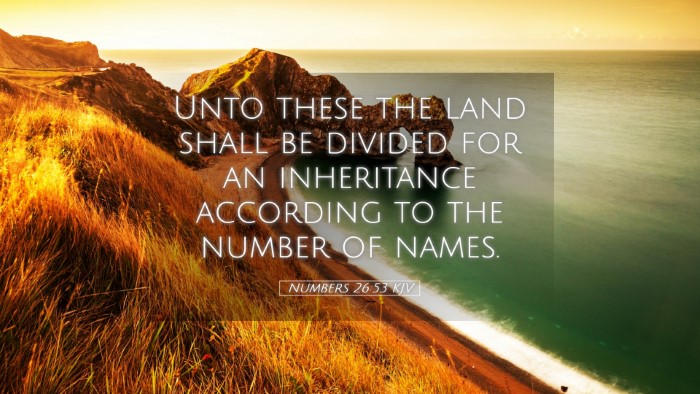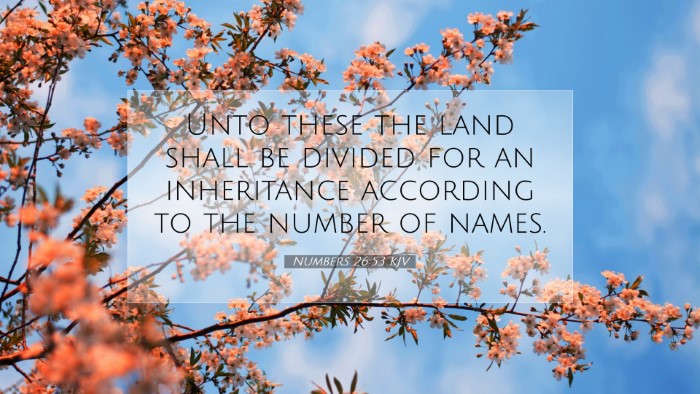Commentary on Numbers 26:53
Verse Reference: Numbers 26:53 - "To these the land shall be divided as an inheritance, according to the number of names." (ESV)
Introduction
This verse is a pivotal moment in the narrative of the Israelites as they prepare to enter the Promised Land. It signifies not only the fulfillment of God's promise but also the organization and distribution of land among the tribes of Israel. The verse serves as a bridge between the census that has just been taken and the actual allotment of land.
Historical Context
The book of Numbers presents a detailed account of the Israelites during their desert wanderings. After significant events like the sending of the spies and the consequent wandering due to disobedience, this census provides a numerical assessment of the community. The population data gleaned from this census plays an essential role in determining the inheritance and settlement of the tribes.
Theological Implications
Numbers 26:53 reflects God's sovereign arrangement and justice in distributing the land among His people:
- Divine Order: The phrase "these the land shall be divided" emphasizes that the inheritance is not arbitrary but ordained by God. This reinforces the concept that God governs all affairs, including land and possession.
- Covenant Faithfulness: The inheritance signifies the faithfulness of God to His covenant with Abraham, Isaac, and Jacob. Each tribe’s allocation serves as a reminder of God’s continual fulfillment of His promises to His people.
- Identity and Belonging: The distribution of land is integral to the identity of each tribe, establishing a sense of belonging and community. Each family unit would have a specific place, reinforcing their corporate and individual identities.
Insights from Commentators
Matthew Henry
Matthew Henry emphasizes the importance of inheritance and how it represents God’s provision for His people. He notes that the inheritance described here is a tangible sign of God’s blessing, reminding us that God cares for the needs and welfare of His people. Henry points out that the land was not merely a possession but a sacred trust from God.
Albert Barnes
Albert Barnes highlights the significance of the census as a mechanism for establishing order among the Israelites. He elaborates on how the division of the land was made according to the number of names, indicating a systematic approach to ensure equitable distribution. Barnes notes that God’s wisdom is evident in this orderly process, which fosters unity and responsibility among the tribes.
Adam Clarke
Adam Clarke dives deeper into the implications of this verse regarding the importance of each tribe. He points to the notion that every individual matters in God’s plan, as the allocation reflects God’s intimate involvement in the affairs of His people. Clarke also discusses the importance of names in this context, suggesting that each name represents a legacy and heritage, thereby enriching the narrative of Israel’s history.
Practical Applications
For pastors and theologians, Numbers 26:53 offers several points for practical application:
- Understanding Community: Leaders should recognize the importance of community in the church. Just as the tribes were given land, congregations should ensure that all members feel valued and included.
- Stewardship: The principle of inheritance urges believers to steward what God has given them. Each person’s contribution, no matter how small, is significant in fulfilling God’s purpose.
- Faith in God’s Provision: This scripture calls for trust in God's provision. Just as God provided for the Israelites, He continues to provide for His people today, both materially and spiritually.
Conclusion
Numbers 26:53 is rich in theological significance and practical implications. It serves as a robust reminder of God's faithfulness, the importance of community, and the assurance of His providence. As believers reflect on this verse, they are encouraged to live lives that honor God’s designs and promote unity within the body of Christ.


